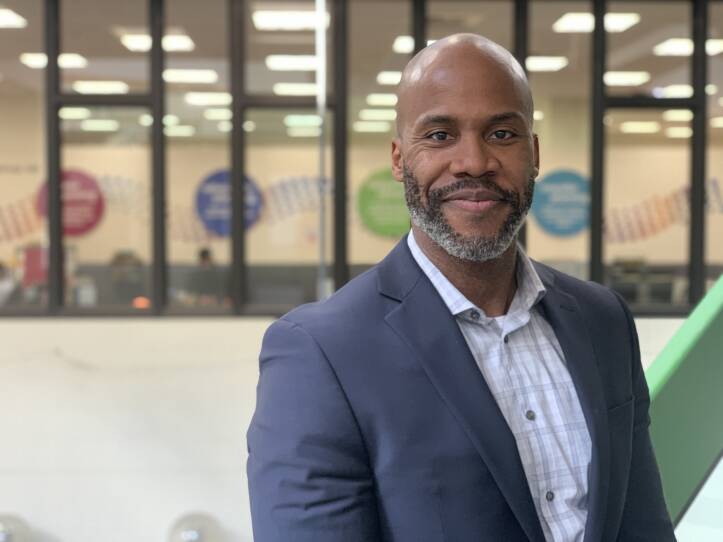Zana Bennett dropped out of college during the pandemic, one of millions of Americans who exited college during the pandemic without a degree.
Diagnosed with vertigo, Bennett also quit her job as a full-time pharmacy technician.
“I was working like 8- to 10-hour shifts a day,” Bennett said in an interview. “When I got the vertigo, I wasn’t able to stand 8 to 10 minutes on my own.”
But unlike many students, Bennett, who is Black and Native American, reenrolled as soon as she was well enough. That clear-eyed resolve to return to college and finish her degree may help explain the findings of a recent report by the National Student Clearinghouse. In its first-ever review of re-enrollment data by race and gender, it found that U.S. women of color, as a group, returned to college in greater numbers than white women and men — and in nearly double the numbers of Black, Latino and Native American men in the 2020-21 school year.
More Education
Economist Nicole Smith at Georgetown University said that’s because women of color bore the brunt of pandemic job losses. As face-to-face work in retail, hospitality and other service sector jobs dried up, women of color turned to higher education in the face of limited job opportunities. Smith said many women of color without degrees viewed a degree as one of the fastest paths to better-paying work and increased economic security.
“Black women understand this and they’re going to school to try to get to that wage,” Smith said.
Men didn’t necessarily face the same pressures, she said. Demand for truck drivers, warehouse workers and other low-skill jobs typically filled by men increased, and those jobs often pay more liveable wages.
“For young men, the pandemic really created a lot of opportunities,” Smith said. “There are many occupations that young Black males can still earn a good living with just a high school diploma and some amount of training.”
The disparity isn’t just about jobs were available in the pandemic. It also has to do with the gendered expectations that men may feel weighing on them.
Economist Richard Reeves, a senior fellow with the Brookings Institution and author of the book “Of Boys and Men: Why the Modern Male Is Struggling, Why It Matters, and What to Do about It,” said girls and women understand the value of education early due to effective messaging about the importance of college — and financial independence — at an early age.
“‘You get educated.’ ‘You go girl.’ ‘Go to college.’ ‘Make sure you stand on your own feet,’” Reeves said, ticking off slogans plastered on posters he observed hanging in middle and high school classrooms across the country. Boys and young men haven’t benefitted from the same targeted effort.
“The women’s movement correctly saw that unless women could really break through in education, they wouldn’t break through in the labor market,” he said, adding that men tend to go right into the workforce to support their families rather than taking out loans for college.
“Men are a little bit more debt averse than women when it comes to college debt,” he said. “That’s not true for other kinds of debt.”
Bunker Hill Community College student Marc Ramirez dropped out of college when he felt pressure to leave school and become a provider for his young family. A junior at UMass Boston, he left school to work at a sports bar, despite $20,000 in student loans and a degree in sight.
“I just feel like with men sometimes we’re stuck thinking, ‘I have to go make money now and if I have a kid, I can’t think long-term,’” he said.
Adrian Huerta, a sociologist who teaches education at the University of Southern California and studies boys and young men of color, said it’s not just about the gender role of breadwinner or “provider” either. Boys of color are much more likely to be disciplined at school or held back and they’re less likely to graduate from high school.
“If you’ve been taught your whole life not to ask people for help — to not be a nuisance to folks — and then you get into higher ed where you’re expected to be proactive in asking for help, there’s already a mismatch,” he said.
Such conflicting messages sow confusion and can undermine men’s motivation to earn a degree.
“That ethos really works on young men of color’s minds so they‘re like, ‘Maybe I’m not smart enough,’” Huerta said.
To win back students, and young men of color in particular, community colleges in Greater Boston and around the country are pushing new strategies.

Evans Erilus runs a peer support group at Bunker Hill Community College that helps young men of color get over a “fear of failure” that they won’t succeed in school.
“Whether it’s a ‘cool pose’ among the Black community or ‘machismo’ among the Latino community, I think that’s what’s getting in the way of things,” he said.
His support group, which hosts regular meetings on campus as well as dinners and other events off campus, tries to foster community.
“I think what it comes down to is mattering — and feeling a sense of comfort,” Erilus said.
As for Zana Bennett, the student who left college due to vertigo, she’s back in class. And she’s feeling right at home in Roxbury Community College’s library, where she settled in to study on a recent afternoon.
She decided to study health care, and plans to earn her associate’s degree next spring. After that, she’s confident she wants to become a registered nurse.
“I feel like my purpose here is to take care of people, to give them that comfort,” she said. “That’s just something that I have to do.”









